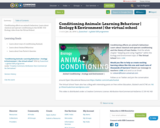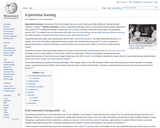
Conditioning affects an animal's behaviour. Learn about classical and operant conditioning in this GCSE / K12 Ecology video from the Virtual School.

Conditioning affects an animal's behaviour. Learn about classical and operant conditioning in this GCSE / K12 Ecology video from the Virtual School.

[6]Experiential learning is often used synonymously with the term "experiential education", but while experiential education is a broader philosophy of education, experiential learning considers the individual learning process.
[22] Jacobson and Ruddy, building on Kolb's four-stage Experiential Learning Model[14] and Pfeiffer and Jones's five stage Experiential Learning Cycle,[23] took these theoretical frameworks and created a simple, practical questioning model for facilitators to use in promoting critical reflection in experiential learning.
Moon has elaborated on this cycle to argue that experiential learning is most effective when it involves: 1) a "reflective learning phase" 2) a phase of learning resulting from the actions inherent to experiential learning, and 3) "a further phase of learning from feedback".
[5] It is related to but not synonymous with other forms of active learning such as action learning, adventure learning, free-choice learning, cooperative learning, service-learning, and situated learning.
Kolb transposes four learning styles, Diverger, Assimilator, Accommodator and Converger, atop the Experiential Learning Model, using the four experiential learning stages to carve out "four quadrants", one for each learning style.